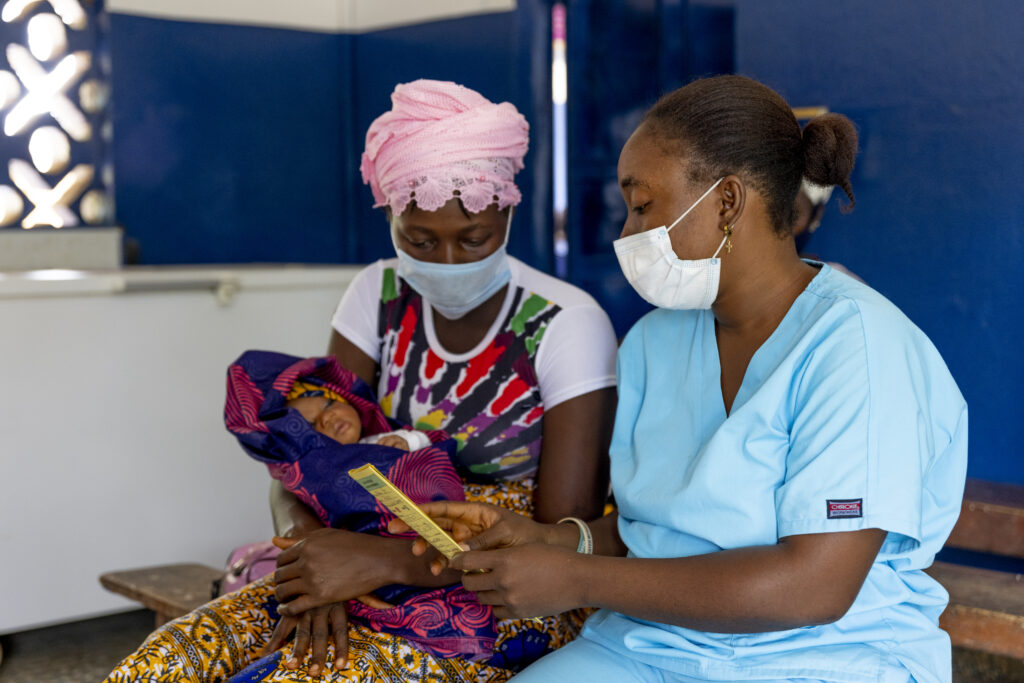In 2021 the global health community continued to battle the novel pandemic of COVID-19 alongside the ancient pandemic of malaria.
Thanks to the bipartisan support of Congress and the generosity of the American people, PMI once again helped 27 country programs in sub-Saharan Africa and Southeast Asia persevere in battling both of these diseases through cross-cutting investments in supply chains, health workers, health infrastructure, and disease surveillance.
Here are a few PMI highlights from this year:
- Welcomed the new U.S. Global Malaria Coordinator. Appointed by President Joe Biden, Dr. Raj Panjabi took the helm of PMI on February 3. Shortly after, Dr. Panjabi spoke with NPR’s Goats and Soda about his personal experiences with malaria.
- Published our 15th Annual Report to Congress. New this year: An interactive Tableau dashboard that allows you to explore the report’s data. In our first decade and a half of fighting malaria and saving lives, we delivered 500 million mosquito nets, 610 million rapid malaria tests, and 715 million fast-acting medicines; protected 23 million children and 42 million pregnant women from malaria through preventive medicines and 310 million people through home spraying; and funded 2 million trainings for health workers.
- Launched our 2021-2026 strategic plan, End Malaria Faster. PMI’s strategy aims to greatly reduce malaria deaths and cases in countries that account for 80 percent of the world’s malaria burden — contributing to the global goals of saving more than 4 million lives and averting over 1 billion cases by 2025. Over the next five years, PMI aims to save lives, reduce health inequities, and improve disease surveillance and global health security. With partners, PMI will maximize program efficiency by addressing five focus areas; reach the unreached, strengthen community health systems, keep malaria services resilient, invest locally, and innovate and lead. For more details, see the full strategy.
- Deepened our commitment to investing locally. In February six researchers wrote in a letter to Nature that “There is a way to create equitable and dignified partnerships and to defeat the diseases that threaten everyone.” We are grateful for their voices, their expertise, and their critique. While we have partnered with local research institutions and NGOs since the beginning, we acknowledge that we have not done enough in working directly with local institutions.
- Embraced the WHO recommendation and celebrated Gavi’s funding decision of the RTS,S malaria vaccine. It is the first vaccine to prevent malaria in children ages 5-17 months living in regions of Sub-Saharan Africa with moderate to high transmission. This vaccine’s introduction has the potential to save tens of thousands of children’s lives each year, as the Coordinator stated with BBC, TIME, Politico, and Voice of America. USAID is committed to work with Gavi and other global and national partners to support countries to deliver essential vaccines that now include this new malaria vaccine as a complementary part of the proven toolkit of malaria interventions. And we take the success of the new vaccine as a siren call that new and effective tools are possible. We need to continue to invest in next-generation tools–insecticides, drugs, and vaccines–that are highly effective, durable, affordable and deliverable to children at greatest risk of malaria.
- Celebrated the International Year of the Health and Care Worker. Our Twitter series “Front Line Malaria Heroes” highlighted health workers from across our partner countries who as midwives, insecticide sprayers, bed net distributors, pharmacists, lab workers, and community health workers help their neighbors prevent and fight malaria. As Dr. Panjabi wrote in TIME in June, “Like genomic sequencing and vaccines, local public health workers are global public goods.” PMI-supported health workers have done more than tackle malaria this year: From Liberia to Thailand, community health workers looking for people with fevers have found people with COVID-19, educated and referred them, tracked their contacts, promoted mask use, and educated their neighbors about COVID-19 vaccines.

Fatmata Kamara, a state enrolled community health nurse, gives some medical advice to Aminata Kamara at Petifu Junction Health Centre on 9th August 2021. Aminata is 28 years old and has six children. She is a trader and lives in Petifu Junction, Loko Masama Chiefdom, Port Loko.
- Continued to provide lifesaving resources and assistance to countries despite the COVID-19 pandemic.
- Thanks to the completion of all nine PMI-supported campaigns, eight million children received preventive medicine to protect them from malaria during the time of the year they were most at risk of contracting it.
- More than 22 million people had their homes protected from malaria-carrying mosquitoes thanks to this year’s successful continuation of all 17 PMI-supported indoor insecticide spray campaigns.
- Families across 15 partner countries can sleep soundly under the mosquito nets successfully distributed through PMI-supported campaigns.
- In parts of Africa, up to 50% of people seek care for fever in the private sector. In order to keep malaria and other essential health services safely available during the COVID-19 pandemic, we signed a loan agreement in August to unlock more than $30 million to support private health care providers in Ghana, Kenya, Nigeria, Tanzania, and Uganda.
